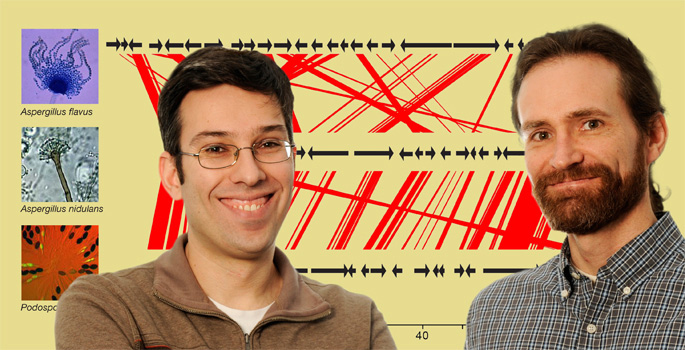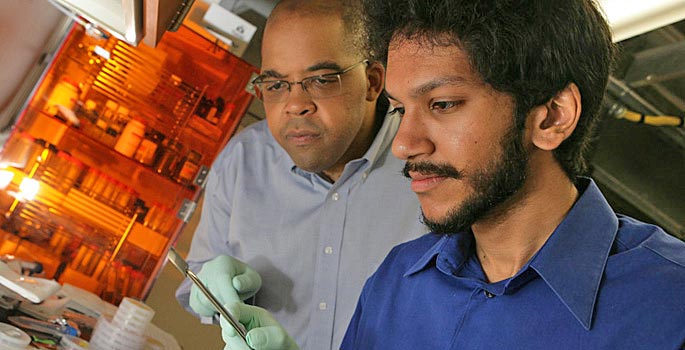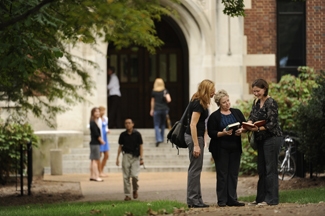Life, Earth And Space
-

Discovery of jumping gene cluster tangles tree of life
Since the days of Darwin, the “tree of life” has been the preeminent metaphor for the process of evolution, reflecting the gradual branching and changing of individual species. The discovery that a large cluster of genes appears to have jumped directly from one species of fungus to another, however,… Read MoreFeb 4, 2011
-

Tuning graphene film so it sheds water
Physicist James Dickerson, left, and graduate student Saad Hasan (Photo by Daniel Dubois) Windshields that shed water so effectively that they don’t need wipers. Ship hulls so slippery that they glide through the water more efficiently than ordinary hulls. These are some of the potential applications for graphene, one of… Read MoreFeb 1, 2011
-

Vanderbilt’s role in largest digital sky image
The Sloan Digital Sky Survey-III collaboration, which includes Vanderbilt University, has resulted in a picture of the sky so big that it would take 500,000 high-definition TVs to view it at full resolution. The color image contains more than a trillion pixels and covers about one-third of the entire sky. Read MoreJan 13, 2011
-

Seven Vanderbilt University Faculty Honored by AAAS Scientific Society
Seven Vanderbilt University faculty members have been elected fellows of the American Association for the Advancement of Science, an honor bestowed upon them by their AAAS peers. They are among 503 AAAS members from around the country who achieved this honor because of their distinguished efforts to advance science… Read MoreJan 12, 2011
-

Babies’ biological clocks dramatically affected by birth light cycle
Graduate student Chris Ciarleglio who performed the study in the McMahon Lab that found the circadian clock in mammals is imprinted by the day/night cycle when an individual is born. The finding may help explain why people born in the winter at high latitudes are at greater risk for seasonal… Read MoreDec 6, 2010
-

New NRC report provides data on 31 Vanderbilt doctoral programs
A new report from the National Research Council offers insights into 31 doctoral programs at Vanderbilt University, and finds the programs to be competitive with those at other top research institutions in the United States. The report is based on data collected for the 2005-2006 academic year… Read MoreSep 28, 2010
-

Scientific team receives award for networking toolkit
Vanderbilt Professor of Physics Paul Sheldon heads a multi-institutional team that has received an Internet2 award for a networking system that they have developed to make it easier to move and store mountains of digital data. Read MoreApr 29, 2010
-

Vanderbilt physicist plays pivotal role in discovery of new super-heavy element
Vanderbilt physicist Joe Hamilton played a key role in the discovery of element 117, a new super-heavy element that has been created and identified by an international scientific team. Discovery of the new element provides new information about the basic organization of matter and strengthens the likelihood that still more massive elements may form an "island of stability": a cluster of stable super-heavy elements that could form novel materials with exotic and as yet unimagined scientific and practical applications. Read MoreApr 7, 2010
-

Media Advisory: Official opening of virtual control room allows Vanderbilt physicists to participate in world’s largest particle accelerator without leaving campus
On Tuesday, March 30, Vanderbilt's high-energy physicists are opening a virtual control room that will allow them to participate fully in the experiments that will be conducted on the world's largest particle accelerator, the $9 billion Large Hadron Collider located in Switzerland. The LHC is beginning its research program on Tuesday and the European Organization for Nuclear Research (CERN), which operates the machine, has invited the world's science press to cover the event. Read MoreMar 29, 2010
-

Human cells exhibit foraging behavior like amoebae and bacteria
When cells move about in the body, they follow a complex pattern similar to that which amoebae and bacteria use when searching for food, a team of Vanderbilt researchers have found. Read MoreMar 11, 2010
-

Vanderbilt physicists play key role in measuring material hotter than the sun
Three Vanderbilt physicists are members of the scientific team that have reported creating an exotic state of matter with a temperature of four trillion degrees Celsius. It's the hottest temperature ever achieved in a laboratory and 250,000 times hotter than the heart of the sun. Read MoreFeb 19, 2010
-

A new type of genetic variation could strengthen natural selection
The unexpected discovery of a new type of genetic variation suggests that natural selection – the force that drives evolution – is both more powerful and more complex than scientists have thought. Read MoreFeb 18, 2010
-

Scientists transplant nose of mosquito, advance fight against malaria
Scientists at Vanderbilt and Yale universities have successfully transplanted most of the "nose" of the mosquito that spreads malaria into frog eggs and fruit flies and are employing these surrogates to combat the spread of the deadly and debilitating disease that afflicts 500 million people. Read MoreFeb 16, 2010
-

Panel celebrates Darwin’s 200th birthday
In celebration of the 200th anniversary of the birth of Charles Darwin, the Department of Biological Sciences and the Law School at Vanderbilt University are jointly sponsoring a panel discussion about the famous naturalist's life and research. Read MoreFeb 4, 2010
-

Sequencing wasp genome sheds new light on sexual parasite
Seth Bordenstein, assistant professor of biological sciences at Vanderbilt, is studying the relationship between this parasitic bacteria and Nasonia, a genus of small wasps that prey on various species of flies, including houseflies, blowflies and flesh flies. Read MoreJan 14, 2010
-

TIPSHEET: The future of Pluto and Ceres
Three years ago, when the International Astronomical Union demoted Pluto to dwarf planet status, the unpopular decision was based on personal opinions and professional politics, not on rigorous scientific criteria that can clearly differentiate planets from lesser bodies, points out Vanderbilt astronomer David Weintraub. In the next decade, however, the amount of knowledge that we have about Pluto and another dwarf planet, Ceres, will change dramatically and this new information may affect our views of these objects and their status in the solar system as asteroids, dwarf planets or planets. Read MoreDec 21, 2009
-

Nuclear energy powered by uranium from the sea could promote peace in coming century
One of the best things the world can do to promote peace and stability in the coming century is to expand commercial nuclear power based on the extraction of uranium from the ocean. That is the proposition which Frank Parker, an internationally recognized expert in remediation of radioactively contaminated soil and water and a member of the National Academy of Engineering, advanced at an exclusive meeting held at the Pontifical Academy of Sciences in the Vatican last month. Read MoreDec 18, 2009
-

Astronomer receives NSF award to study black holes’ evolution and to support Fisk-Vanderbilt minority Ph.D. program
Vanderbilt University Assistant Professor of Physics and Astronomy Kelly Holley-Bockelmann has been awarded the National Science Foundation's largest ever Faculty Early Career Development grant in the field of astronomy. She will use the prestigious award to continue her studies of black holes while supporting the university's innovative program designed to make the university the top producer of underrepresented minorities with Ph.D.s in physics and astronomy. Read MoreDec 17, 2009
-

New study confirms exotic electric properties of graphene
First, it was the soccer-ball-shaped molecules dubbed buckyballs. Then it was the cylindrically shaped nanotubes. Now, the hottest new material in physics and nanotechnology is graphene: a remarkably flat molecule made of carbon atoms arranged in hexagonal rings much like molecular chicken wire. Read MoreNov 17, 2009
-

Interdisciplinary research team to develop novel drug detection technology using software that acts like a robotic scientist
With the support of a $2.7 million Recovery Act grant from the National Institute of Drug Abuse (NIDA), an interdisciplinary team headed by Vanderbilt chemist John McLean and physicist John Wikswo will attempt to determine whether an individual's white blood cells retain chemical memories of exposure to drugs like cocaine and alcohol that can be read reliably and unambiguously. Read MoreNov 9, 2009